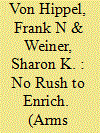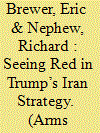| Srl | Item |
| 1 |
ID:
168009


|
|
|
|
|
| Summary/Abstract |
Last year, President Donald Trump told reporters that he wanted to work with Russian President Vladimir Putin “to discuss the arms race, which is getting out of control.”
Unfortunately, Trump’s national security adviser, John Bolton, stiff-armed a proposal supported by the Defense and State departments to engage in strategic stability talks with Moscow. Bolton also persuaded Trump, without a viable plan B, to terminate the 1987 Intermediate-Range Nuclear Forces Treaty in response to alleged Russian violations of the treaty.
|
|
|
|
|
|
|
|
|
|
|
|
|
|
|
|
| 2 |
ID:
168013


|
|
|
|
|
| Summary/Abstract |
During the 2018 Panmunjom Declaration and the Pyongyang Joint Declaration, President Moon and Chairman Kim agreed on complete denuclearization of the Korean Peninsula and the establishment of a permanent peace regime, alleviation of military tensions and practical mitigation of the risk of war, and a broad and groundbreaking development of inter-Korean relations.
|
|
|
|
|
|
|
|
|
|
|
|
|
|
|
|
| 3 |
ID:
168011


|
|
|
|
|
| Summary/Abstract |
In October 2018, the U.S. National Nuclear Security Administration (NNSA) announced its decision to reestablish a domestic uranium-enrichment capability in the United States.1 As described in its fiscal year 2019 Stockpile Stewardship Management Plan, the NNSA said there is a pending shortage of U.S.-origin low-enriched uranium (LEU) needed to fuel the nuclear reactors that produce the tritium gas used in U.S. nuclear weapons. The NNSA initially estimated a need for new supplies of LEU by 2027, but after an internal review identified additional materials, this date was deferred until at least 2038.2
|
|
|
|
|
|
|
|
|
|
|
|
|
|
|
|
| 4 |
ID:
168010


|
|
|
|
|
| Summary/Abstract |
Since Iran’s May 2019 announcement that it would no longer abide by some nuclear restrictions under the Joint Comprehensive Plan of Action (JCPOA), the Trump administration has sought to push back against these moves by citing the imperative of the JCPOA’s constraints. The JCPOA created limits on Iran’s nuclear fuel cycle that mean Tehran would need a year to produce enough nuclear material for a bomb, and the agreement established enhanced transparency and inspector access throughout the entire fuel cycle.
|
|
|
|
|
|
|
|
|
|
|
|
|
|
|
|
| 5 |
ID:
168012


|
|
|
|
|
| Summary/Abstract |
Pavel Palazhchenko has witnessed historic arms control efforts from a unique position: the interpreter’s seat next to top Soviet leaders as they negotiated the Intermediate-Range Nuclear Forces Treaty. In the arms control community, he is instantly recognizable because of his consistent presence in images of Soviet leader Mikhail Gorbachev meeting with U.S. President Ronald Reagan during the 1980s. Palazhchenko’s experience offers an unusual perspective on the process of arms control negotiations and the value of U.S.-Russian engagement today. He spoke with Arms Control Today on June 8 by phone from Moscow.
|
|
|
|
|
|
|
|
|
|
|
|
|
|
|
|
| 6 |
ID:
168014


|
|
|
|
|
| Summary/Abstract |
In 1974 and 1975, two influential Cold War nuclear strategists used the pages of the still-young journal Foreign Policy to debate how to achieve stability in the U.S.-Soviet nuclear rivalry. Their discourse contributed to the course policymakers followed for decades after and continues to have relevance today as U.S.-Russian arms control agreements appear to be on the rocks.
|
|
|
|
|
|
|
|
|
|
|
|
|
|
|
|